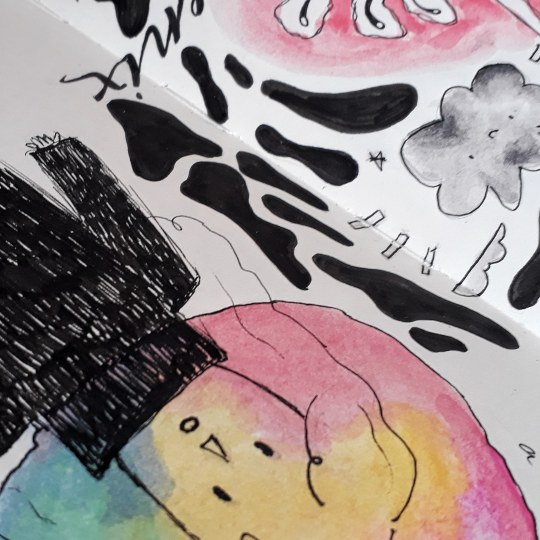Le regroupement du bordel non logique qui se trouve dans ma tête.
Don't wanna be here? Send us removal request.
Text
What to keep in your bag: University edition
Alright, sit down youngin's and let me tell you what to keep in your bag for university (and why). First things first, get a backpack that's going to hold up. Your bag is going to get abused and you don't want to have to replace it in the middle of the semester.
Reusable water bottle/coffee cup: firstly, it's good for the environment. Secondly, you might get discounts for having it.
Pencils, pens, writing utensils: basically, get a pencil case. Fill it. Never trust a single pencil or pen. I once had to write half a calculus exam in bright pink pilot frixon because my mechanical pencil died. Trust nothing.
Mini stapler: put it in the pencil case. You'll need it, or someone else will need it and you don't really want to have to hunt around the library for one.
Washi/normal tape: have you ever tried making a poster without tape? Keep spare tape with you, the library might charge for it.
Notebook: listen, maybe you're going to take notes on your laptop. That's great unless you forget to plug it in the night before and it dies in the middle of your lecture. Have a back up.
Laptop: you only need to bring this if you're actually going to use it. Don't bring it just in case, we both know whatever you want to do can probably be done on your phone. That thing takes up precious backpack space, and this isn't highschool where you get to put things in a locker.
Wireless mouse: Excel on a laptop scroll pad. Not the worst, but it's not fun either. Bring a mouse. (Only if you're bringing your laptop though)
Earbuds: the bus sucks without them. Mine only break on midterm days
Lab coat/manual/safety glasses: if you're in science, you have labs. You don't want to be the kid who can't get into their lab because they forgot their coat/glasses. You also don't want to be the kid who doesn't know what they're doing because they don't have a manual.
Planner: listen, I don't care how you do this. I have an ongoing to-do list with dates for every course on Google docs, as well as a physical planner. Do whatever works for you, but keep track somehow.
Hand sanitizer: Germs. Germs everywhere. Everyone is sick. You don't want to be sick (writing a physics midterm with strep throat isn't fun guys). Sanitize yourself.
A small hand moisturizer: so you've sanitized your hands 5 times a day for a week and now your hands are dry. Have a small moisturizer with you. I find LUSH samples are really good for this.
Kleenex: you got sick (s a n i t i z e). It's cold. Your nose is running. It's awful. Have Kleenex.
Tylonel/Ibuprofen/antihistamine: headaches, cramps, sore throat, allergies. We both know you're probably going to that lecture anyway. Have the drugs that will help you.
Tea bags: this may sound funny, but campus coffee shops will probably let you have free hot water and milk. This is cheaper than buying tea everytime you want some.
Lunch/snacks: campus food is expensive, need I say more?
Sweater/hoodie/cardigan/jacket: I know it's a summer course, but you know what's freezing? The lecture hall. The lecture hall is freezing.
Gloves: winter. Snow. Rain. Cold. Gloves. Especially if you're bussing.
Plastic bag: line the inside of your big backpack pocket with a plastic bag. It might look funny, but it'll protect your stuff from puddles and spills
Tampons/pads: uterus bearing humans make sure you are equipped at all times.
Those are the main things. Don't bring textbooks unless you're for sure going to use them because those are heavy. I'm not listing things like your keys and wallet here because I hope you have both of those.
Good luck,
@anothercupofstudying
2K notes
·
View notes
Text
40 Study Tips & Tricks
I thought to write down the “script” to one of my most viewed videos, with 40 study tips & tricks. It’s easier to read them and pass on the word!
Organization Tips:
1. Incorporate homework and classes in you daily planner – that will give you an overall glimpse of how your week will be about and how much time you need to spend in your studying sessions!
2. Color coordinate classes – be it notes, your planner, your textbooks or binders, pick a unique color for each class and work around the hues of that color to get more organized!
3. Make your own syllabus – if your professor doesn’t provide a syllabus for your class, try to make one before the school year working around your given textbooks or other given material.
4. Make study guides – make a study guide from your syllabus and draw before each topic two boxes: one for a midtest and one for the final test. When you have one of these tests, check the boxes when you’ve finished studying the chapter so you won’t miss anything!
5. Reference your material throughout – most of the times, we students work with in-class notes, textbooks and a syllabus. Since we get small bits of information here and there it’s important to reference every page throughout all your material so you can quickly access your information without having to flip endlessly through pages!
6. Keep a dashboard nearby – Whenever you use a notebook or a binder, make a dashboard on the first page with post it notes so you can quickly scribble any questions, homework or page numbers. When you get home, you just need to open your dashboard and attend those notes.
7. Print any tests, exercises and exams you can find – keep those in the end of your binder. These are perfect to practice before exams and tests because they really reflect what you will be tested about. Set an alarm clock for the deadline and start working on those!
8. Condense – organization disappears when you have too many of everything. Working with more than one planner in your life will make everything chaotic. If you think you need a second planner because you don’t have enough space to write in the first one, it’s because you don’t have available time as well. Don’t fool yourself and set achievable goals!
9. Customize your textbooks – most of the times, textbooks are formal books where information is hard to come by. Make your own tabs and write every chapter on them so they stick out – flag any charts, tables or graphics. Everything needs to be incredibly accessible!
10 Print a special planning sheet before finals: Organizing your studying by chapters and/or topics before finals is tremendously important since it lets you organize the amount of time you dedicate to each subject,
Study Sessions and Time Management
11. Save at least one afternoon or one morning a week for intensive studying. These is your “life-saver” – when you get so full of homework and projects that you can’t incorporate them into your daily academic routine, one free afternoon to organize your school life will really come in handy! Make an appointment with yourself!
12. Prepare in advance – although most professors may not ask you to prepare a class in advance, if you have the means to, go ahead. Grab a sheet and make a summary of the chapter your class will be about. Write the major topics and key information and take that guide to class. When your professor repeats previously studied information, you will be able to understand everything much better!
13. Never leave something behind – Even if you have a more light class, where professors don’t request homework or any side projects, don’t let that fool you! Be disciplined and be your own professors! Make your own projects and learn everything you can so you can nail those finals when they arrive.
14. Write your questions – most of the time, in a heavy study session, we come up with tons of questions and sometimes we just leave them behind. Write them down in your dashboard or a small notebook and ask your professors (personally or via e-mail). You can also ask your schoolmates in a facebook group created for that purpose!
15. Set an alarm clock and reward yourself – even if you study during an entire afternoon your studying will be pointless if you don’t take regular breaks. Set an alarm clock for one hour/one hour and a half and then take a 15 minute break. Never study for more than 2 hours straight! Even if you don’t notice, you’ll get less and less focused.
16. . Make a list – before each study session I like to grab my notepad and write down everything that I need to do before my session ends: the chapters I need to read, the pages I need to go through and the homework I need to complete. Sometimes I even write theses lists when I’m in college so I’ll have more determination to complete those tasks once I get home.
17 Work on the least interesting thing first. There are always classes or projects that we like the least – and those are the ones that we need to tackle first. You will start your studying session concentrated, which will let you go through the worst tasks faster.
18 Print, print, print. try to print everything you can and never study from your computer. Having your PDF files printed at hand will let you concentrate better, highlight and write some notes in the margins. You can take these everywhere with you and even turn them into small guides for future classes!
19. If you finish ahead, don’t quit. Perhaps the time you’ve saved for your study session has come to an end way before you have planned. That doesn’t mean you should stop right now – Take that time to review what you’ve learned so far or prepare other classes ahead of time!
20. Study in an organized space – make your own studying corner – bring everything you will need, from textbooks, binders and notebooks, to a cup of coffee and your computer. Keep them neatily organized on your desk so everything is at hand and on sight. Put on some soft background music (links down below) and adjust the lightning.
In class notes
21. If your professor provides PowerPoint slides before each class, print them (six or four per page) and bring them to class. Write in the margins and more throughout information in the back so it’s all condensed and tight. This is where you’ll take your notes. If you prefer to write on lined paper, think about copying some ruled paper to the back of your printed slides.
22. If your professor asks you to prepare your class in advance, try to make a small guide for each class. Open the comments column in MSWord and print the pages with that column. When you go to class, incorporate the in-class notes in that column, next to the relevant information so everything is nice and condensed.
23 If you are in a information-heavy class, try to adopt the Cornell method, which is the best, in my opinion, when you need to be a fast writer. There’s a video right here on how to use this method.
24. If you are in a bits-and-pieces class, which is that kind of class where the professor just gives a few key points and then gives practical examples or makes you work in group, try to adopt the box method – you can draw these boxes yourself or make them with post it notes – these are way more visual and perfect to memorize information.
25. Write in-class flashcards – if you don’t have flashcards around, make tiny flashcards on the top of your notes, where you cover the definitions you’ve written with the name of the definition. Each time you open your notes, try to remember the hidden definition. Automatic studying, every time!
26. Participate in class – nothing better than to be actively involved in your class discussion. For most of us, shy creatures, participating can be dreadful – but once you get out of your box, you’ll see how participating really makes you understand the subject!
27. If you have any questions during class, raise your hand and ask them. If your professor doesn’t like being interrupted, write them down and approach them in the end of the class. Sometimes, the little things we don’t understand are exactly the ones that come up on the final exam!
28. Ask for examples. Examples are probably the thing that makes your brain connect the information faster. If your professor isn’t keen on providing examples, suggest your own and see if your answer comes up right. Sometimes, examples are the thing that really makes us understand our material and our definitions, since they transform formal information into relatable events.
29. Sit at the front. It sounds too straightforward but sitting at the front really makes wonders. You won’t get distracted by what you classmates are doing, you will focus on the professor, who is right in front of you and you will resist the temptation of going to Facebook and Instagram during a boring presentation.
30. Write a brief summary at the end of the class. During those five minutes where everyone is dismissed and leaving the room, write a brief summary of that classes’ key points in the back of a page – this is fundamental in the Cornell method but can be used in any other method as well.
Finals Guide
31 Skim through your material two times: at first, you should start by studying your material starting from the end. The last lessons will be fresh in your memory and it’s very important to reinforce your knowledge on these while you can. In the second reading, you should start from the beginning, as usual. It’s important to make these two readings so you can go through the information in a much more flexible way.
32. Make a mindmap of each chapter. A mindmap is a chart that relates key words and important information, making it easy to understand the relationship and hierarchy between such key words. Use colors and images to memorize your material better. Oh, and don’t forget to check out my video on how to make mindmaps!
33. Read each of the titles and try to say out loud its contents, explaining each concept and the relationship between them. Imagine you are the teacher and are lecturing that subject to a crowd. If you skip any of the subjects, do it all over again. The more you repeat, the better you will memorize.
34. It’s time for some flash cards! Write the topic or the title on one side and the meaning or the explanation on the other. Try to cover as many topics or titles as you can and go through your cards while memorizing as best as you can each of the concepts. Try to do it backwards if you have time to do so!
35. On the day before the exam, skim through your mindmaps and flash cards again and always try to study while talking. Saying your content out loud will force your brain to relate information in a much more cohesive way and you’ll memorize everything much better.
36. Read the entire exam from top to bottom. Underline or circle any important words that you think will be crucial in you answer. After that, calculate how much time you should spend answering each question: this simple calculation will take only twenty seconds and will help you organize your time. Try to save five minutes at the end for revisions.
37. If you are solving a written exam and not multiple choice, try as much as possible to organize each answer in a structured way, saving two lines just to present your line of thought and writing each different argument in a different paragraph. Draft a conclusion at the end to underline the centre of your answer. Sometimes softly underlining some keywords is important to make your professor notice that you’ve correctly given importance to certain concepts.
38. Use these symbols for each question: one dot if you aren’t sure of the answer, two dots if you are sure of your answer and a circle if you are completely unaware of your answer. Start by answering any question with two dots; after those are all answered, go on through the two dots question. Leave the circle questions to the end – and ALWAYS answer them! Even if you don’t know what they’re about, who knows if you will be able to come up with something right?
39. Review your test one final time – many times, we make a lot of mistakes under stress and now is when you should spot them and amend them. This can be the difference between a B and an A!
40. Don’t take this too seriously – school is an important aspect of our lives but it isn’t everything. Failure comes many times and these failures can even drive you away from something that was simply not meant to be. Don’t stress out because everyone goes through the same!
25K notes
·
View notes
Text
how to win at college
this also applies to high school in a lot of ways, esp in organization and involvement
I read this book by cal newport called “how to win at college” in prep for my freshman year & u should definitely read it yourself because there are lots of important points i don’t cover in this post, but if you don’t want to, this is my summary of what I think were the most important points he made.
STUDY HARD, BUT YOUR GRADES DON’T MEAN AS MUCH AS WHAT YOU LEARN OUTSIDE THE CLASSROOM. he prioritizes getting vital experiences such as
- joining a club and eventually taking responsibility in it and becoming a leader
- apply for scholarships every year (he said 10 a year)
- volunteer, but not for your resume. do it to learn and become a better person.
- get involved in research, and get involved in your major department (like go to the events and lectures, even if they aren’t mandatory)
- write outside of class regularly because writing is super important (example- submit to your school newspaper)
STAY ORGANIZED AND ON TOP OF YOUR SHIT
- he really really REALLY emphasizes not procrastinating and studying / starting papers well in advance of deadlines. his rules are to
- - >start long term projects immediately after they are assigned and continue to work on them by following a reasonable schedule (he says to finish early, revise, then finish again),
- - > take 3 days to write shorter papers (aka you have abt 2 weeks to work on them and they range from 2-15ish pages) (aka make preparations pre writing, then write a rough draft on the first day, revise and focus your writing on the second day (make sure your arguments are very clear!), and polish your paper on the third day), and
- - >take 2 weeks to study for an exam. study in shorter blocks during the first week, like maybe an hour or so each day. over the weekend, add more hours. the few days before the test, study in 2-3 hour chunks to really cement the already familiar information.
- get a filing cabinet for your papers instead of just piling them on your desk and having to search for them later.
- have a HIGH QUALITY notebook and a folder for each class (or whatever stationery keeps you organized) and keep all your folders/notebooks/binders neat and organized.
- empty your inbox and organize your emails
- schedule your free time- aka have specific times that you choose to relax and spend with friends rather than unintentionally relaxing during work time, or worrying about work during relaxation time.
TAKE CARE OF YOURSELF
- you NEED sleep, you NEED healthy food, and you NEED exercise. you really shouldn’t put anything ahead of these things.
- NEVER pull an all nighter. if you’re studying ahead of time, this should be easy. all nighters aren’t glamorous, they’re unproductive, really stressful, and unhealthy
- keep in touch with old friends, and remember to call your mom
- make sure to spend time with new friends and take care of them. be there for your friends.
- keep your room neat and make your bed!!
like i said, there is a lot of important stuff that I didn’t cover so i recommend reading the book how to win at college by cal newport, and take what you need to from it. good luck!!!
25K notes
·
View notes
Text

Je vois l'art comme une forme de libération. Quand je pose mon pinceau sur le papier, j'ai comme l'impression que mes pensées sont emportées dans le tourbillon d'encre.
Le mieux, c'est l'abstrait. C'est un défouloir. Je balance des couleurs et des teintes dans tous les sens jusqu'à qu'il n'y ait plus un centimètre carré de blanc sur le papier. J'agis, et j'avise après.
Le mieux, dans l'art, c'est qu'on est libre de faire littéralement ce qu'on veut. Les seules limites réelles à la création sont celles que l'on s'impose soi-même.
Et c'est beau, la liberté.
0 notes
Text

J'aime la pluie.
La pluie, c'est un temps à se blottir dans sa couette avec un thé bien chaud, en train de dévorer un bon bouquin. Ou en été, un temps à sortir profiter de la fraîcheur, comme un oasis dans le désert.
C'est un temps à se blottir sous la couette avec un thé bien chaud, en train de dévorer un bon bouquin. Ou en été, à sortir danser en dessous, et profiter de cet oasis de fraîcheur.
Bref,
J'aime
La
Pluie
☔
0 notes
Audio
Un morceau rock qui déchirait, qui te mettais un coup de boost au fesses, qui te faisais l'effet d'un double expresso, résumé à quelques accords simples et doux au piano mêlés à une voix avec un grain et une sonorité superbe. Je n'ai plus les mots tellement c'est magnifique à pleurer. Chester, pourquoi es-tu parti ?
0 notes
Text
"La musique s'écoute, se voit, se touche, se sent, se vit, en plusieurs dimensions."
0 notes
Quote
Tu n’es plus là où tu étais mais tu es partout là où je suis
Victor Hugo (via lacoupelledecarmen)
1K notes
·
View notes
Text
If it comes, let it. If it goes, let it.
94K notes
·
View notes
Photo

J'ai un problème avec les planètes. J'ai l'impression qu'il y en a de partout. Surtout dans les yeux des personnes que tu croises. Certaines baissent les yeux, mais ceux qui te regardent franchement ont des petites planètes à la place des yeux. Des bleues claires. Des noires comme la nuit. Des vertes fades. Des brunes marécageuses. Des multicolores. Et tu te demandes comment eux, il voient l'univers, avec leurs petites planètes.
0 notes
Text
Les limites de mon langage sont les limites de mon monde.
Ludwig Wittgenstein
0 notes
Audio
Who cares if one more light goes out in a sky of a million stars ?
La réponse est simple : personne.
Autant se demander si on se préoccupe de toutes les personnes qui meurent d’une autre façon que naturellement, la réponse sera la même.
0 notes
Photo

Assieds-toi, sinon tu risques de tomber tellement ça retourne le cerveau. En philo, on a vu (en métaphysique) qu’il serait possible que nous soyons le monde. Je m’explique.
En gros, on pourrait être un sujet, qui a créé le monde avant d’incarner un être humain, et oublier pourquoi, comment on a créé le monde, et qui on est. Donc toutes les personnes que tu croises, tes amis, tes parents, tout ce que tu connais pourrais être seulement le fruit de ton imagination. Quand tu parles à quelqu’un, comme un programme informatique, elle réagit à tes dires. Et tout cela tu l’aurais créé à un moment où tu te serais demandé : “Ah, je m’ennuie aujourd’hui... et si je créais un monde ?”.
Bien sûr, cette proposition que l’on peut qualifier de loufoque, égoïste et j’en passe pourrait être totalement fausse. Mais comme nous n’en avons pour le moment aucune preuve, pourquoi pas ?
Si tu es tombé.e, je t’avais prévenu.e...
0 notes


